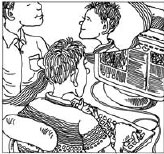Exception should be the norm
Updated: 2007-08-11 05:07
The Internet is a mind-boggling platform when it comes to communication. Perfect strangers can meet there and conduct meaningful conversations, which may lead to special relationships and, in some cases, even marriage.
This week, a 32-year-old Chong-qing resident sent an e-mail to the Party secretary of the municipality, and soon got a response from the leading official of this province-level administration. One more exchange later, he was summoned to a face-to-face meeting with both the secretary and the mayor.

This was widely reported by the press and dissected from every angle by pundits. But what does it really mean?
Du Shulin, the netizen, had submitted a 10-point proposal on how to build up his hometown - this vast municipality that incorporates a downtown metropolis and large swathe of countryside. He did it in answer to Party Secretary Wang Yang's call for good ideas.
What made it special, it seems, was that Wang took the trouble to respond and then meet him for further dialogue; and what made it newsworthy was the identity of this "ordinary citizen" - a netizen nonetheless.
This cannot hold water, though. If he had sent in his proposal via telephone or post, this would probably be buried in the local paper and never picked up by others. And what's so special about being a netizen?
Suffice it to say, China's online population is a skewed reflection of the general public. But as it grows to 162 million strong, it is losing more and more of its uniqueness as a demographic. In other words, this would not have moved more quills of appreciation than necessary if the official already had regular channels of communication with his citizenry.
However, we must remember that the Internet has taken on an irreplaceable role when it comes to mass rejection of unpopular policies. When another city planned to build a facility of potential chemical hazard in close proximity to residential districts, it was the Internet that allowed citizens to aggregate their voices and ultimately block the project from turning into a local nightmare.
In my understanding, the Internet is just icing on the cake for regular government-citizen communication. If an official picks the brains of only a select group, e-mail suggestions are not going to pile up on his desk. But if he makes an extreme move that offends a significant portion of the populace, the Internet - and to some extent, mobile short messaging - can give voice to the public that otherwise cannot be heard.
The Chongqing official deserves plaudits for his willingness for citizen brainstorming. While it is unrealistic for an official of his stature to sit down and talk to everyone who sends in advice, a public official should have a mechanism to hear out public opinion.

Letters and e-mails should be sorted and forwarded to the right departments. They should be categorized: those that require immediate action should be effectively addressed, and those that cannot be solved should be explained to the sender. Issues of mass interest should be publicized in the media to raise awareness.
There is an undertone to the national media's hyping of the Chongqing story: People extol what that official did because it was extraordinary. He went out of his way to welcome public opinion. If most officials were open to such grassroots input, the story would not have much news value.
So, it is important to turn an exception, more or less, into a norm. Yes, some officials know how to reach out and talk to their constituents, but others should see them as role models and make an effort to improve discourse with those they serve. Social harmony is only possible when public has a say in the decision-making at city hall.
(China Daily 08/11/2007 page4)
|
|
|
|
|
|